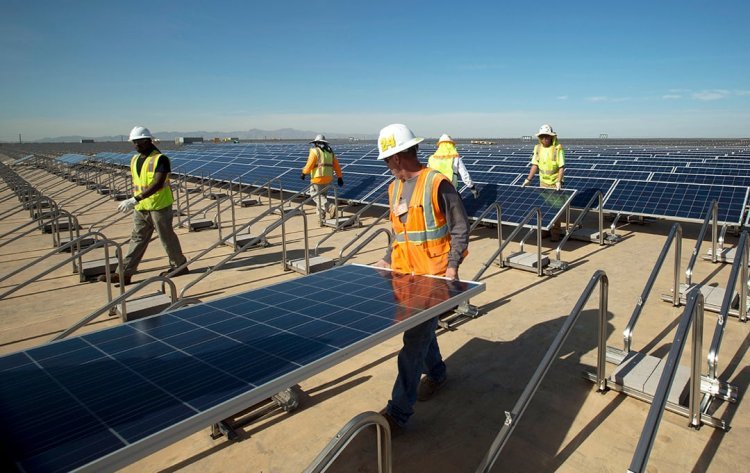Unlocking the Potential of Commercial Solar Panel Installation: A Comprehensive Guide
Discover the benefits and process of commercial solar panel installation. Reduce costs and carbon footprints with expert guidance. Learn more!

In the realm of sustainable energy solutions, commercial solar panel installation stands out as a beacon of promise. With its potential to reduce carbon footprints and operating costs simultaneously, it's no wonder that more businesses are turning to solar power. However, navigating the complexities of commercial solar installation requires careful consideration and expertise. In this guide, we'll delve into the fundamentals of commercial solar panel installation, exploring its benefits, the process involved, and the key factors to consider when choosing a commercial solar panel company.
Understanding Commercial Solar panel Installation
Commercial solar panel installation involves the deployment of photovoltaic (PV) panels on commercial properties to harness sunlight and convert it into electricity. Unlike residential installations, commercial projects are often larger in scale and require meticulous planning to ensure maximum efficiency and return on investment.
Benefits of Commercial Solar Installation
The advantages of opting for commercial solar installation are multifaceted:
- Cost Savings: One of the primary motivations for businesses to adopt solar power is its potential to reduce electricity bills significantly. By generating their own electricity, businesses can offset or even eliminate their reliance on grid power, thus lowering operational expenses in the long run.
- Environmental Impact: Solar power is a clean, renewable energy source that produces minimal greenhouse gas emissions compared to traditional fossil fuels. By transitioning to solar energy, businesses can significantly reduce their carbon footprint and contribute to a more sustainable future.
- Financial Incentives: Governments and utility companies often offer various incentives, such as tax credits, rebates, and net metering programs, to encourage the adoption of solar energy. These incentives can further enhance the financial viability of commercial solar installations.
- Energy Independence: Relying on solar power provides businesses with a degree of energy independence and resilience against fluctuations in utility prices and supply disruptions. It offers a reliable source of electricity that can contribute to business continuity and stability.
The Commercial Solar Installation Process
While the specific steps involved in commercial solar installation may vary depending on factors such as site characteristics and regulatory requirements, the general process typically includes the following stages:
- Initial Consultation: The process begins with an initial consultation between the business owner and a reputable commercial solar company. During this stage, the solar company assesses the feasibility of solar installation, analyzes energy consumption patterns, and determines the optimal system size and configuration.
- Site Assessment: A comprehensive site assessment is conducted to evaluate factors such as available roof space, orientation, shading, and structural integrity. This assessment helps determine the most suitable location for solar panel installation and ensures optimal sunlight exposure.
- Design and Engineering: Once the site assessment is complete, the solar company designs a customized solar energy system tailored to the specific needs and constraints of the commercial property. This phase involves detailed engineering to optimize system performance and compliance with local building codes and regulations.
- Permitting and Approvals: Obtaining necessary permits and approvals from local authorities is a crucial step in the installation process. The solar company manages the permitting process on behalf of the business owner, ensuring compliance with all relevant regulations.
- Installation and Commissioning: With permits secured, the installation phase begins. Experienced solar technicians install the PV panels, inverters, mounting hardware, and electrical wiring according to the approved design. Once installation is complete, the system undergoes rigorous testing and commissioning to ensure proper functionality and safety.
- Monitoring and Maintenance: After the system is operational, ongoing monitoring and maintenance are essential to maximize performance and longevity. Many commercial solar companies offer monitoring services to track energy production, identify potential issues, and optimize system efficiency over time.
Choosing the Right Commercial Solar Company
Selecting the right commercial solar panel company is critical to the success of your solar installation project. Here are some key factors to consider when evaluating potential solar providers:
- Experience and Expertise: Look for a company with a proven track record of successful commercial solar installations and extensive experience in the industry. Experienced providers are better equipped to navigate complex projects and deliver optimal results.
- Reputation and Reviews: Research the reputation of each solar company by reading customer reviews, testimonials, and case studies. A reputable company with positive feedback from past clients is more likely to deliver high-quality service and customer satisfaction.
- Quality of Components: Inquire about the quality of solar panels, inverters, and other components used by the company. High-quality equipment is essential for maximizing energy production and ensuring the long-term reliability of your solar system.
- Warranty and Support: Evaluate the warranty offerings and post-installation support provided by each solar company. A comprehensive warranty and responsive customer support are essential for peace of mind and timely resolution of any issues that may arise.
- Customized Solutions: Choose a solar company that offers customized solutions tailored to your specific energy needs, budget, and site conditions. Avoid one-size-fits-all approaches and prioritize providers who take the time to understand your unique requirements.
By considering these factors and partnering with a reputable commercial solar company, businesses can embark on a seamless journey towards harnessing the power of the sun and reaping the myriad benefits of solar energy. From cost savings and environmental stewardship to energy independence and resilience, commercial solar panel installation holds immense potential for businesses seeking sustainable and economically viable energy solutions.
Conclusion
In conclusion, commercial solar installation represents a transformative opportunity for businesses to embrace clean, renewable energy and pave the way for a greener future. With careful planning, expert guidance, and the right solar partner, businesses can unlock the full potential of solar power and embark on a path towards sustainability and prosperity.
What's Your Reaction?










![Wireless Connectivity Software Market Size, Share | Statistics [2032]](https://handyclassified.com/uploads/images/202404/image_100x75_661f3be896033.jpg)



